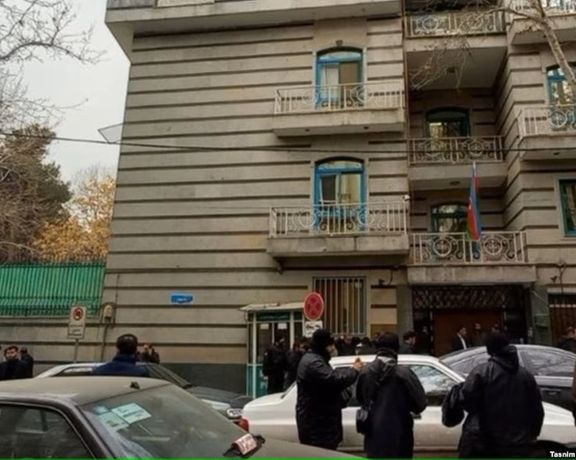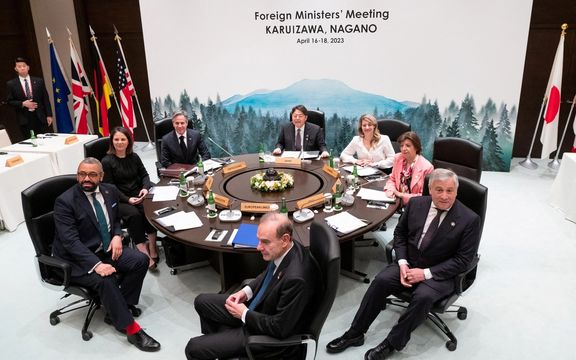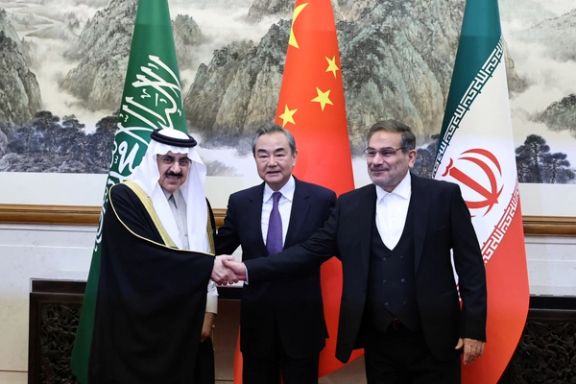Azerbaijan Claims It Arrested 20 Iranian Agents, Amid Tensions

“Twenty local agents” of Iran’s Ministry of Intelligence have been arrested in Azerbaijan according to local media.

“Twenty local agents” of Iran’s Ministry of Intelligence have been arrested in Azerbaijan according to local media.
The suspects were spreading superstitions to undermine the Baku government under the guise of religious activities, Azerbaijani Ministry of Interior sources told the APA news agency.
The alleged agents are also accused of promoting drug trafficking.
This is the latest in a series of arrests in Azerbaijan of groups affiliated with Iran's Intelligence Ministry in recent weeks.
Relations between Azerbaijan and Iran have been strained in recent months after Baku announced plans to open formal diplomatic ties with Israel.
Azerbaijan closed its embassy in Tehran after an armed attack on it in January.
Earlier this month Azerbaijan expelled four Iranian diplomats over what it called “provocative actions”, possibly referring to several military exercises carried out by Iran's armed forces on the border over the past year.
Tehran accuses Baku of harboring Israeli intelligence and military elements that plan to use its territory in a possible attack against Iran’s nuclear installations.
Around a quarter of Iran’s population is Azari, with analysts and activists disagreeing over the closeness of their cultural and linguistic links to their neighbors to the north.

Belgium’s government has made a formal request to Iran for the return of a jailed aid worker after the signing of a controversial prisoner exchange treaty.
Olivier Vandecasteele has been held in the Islamic Republic since last year on spurious charges of “spying and cooperation with the United States, money laundering and smuggling $500,000 out of Iran.”
An Iranian court sentenced the humanitarian worker to 40 years in prison and 74 lashes, it was announced in January.
Vandecasteele, 41, has been employed by Médecins du Monde, Norwegian Refugee Council (NRC), and Relief International. He worked for humanitarian organizations in Iran for more than six years before leaving the country, but was lured back by “a girlfriend” and was detained in February 2022.
He has been subject to torture, according to Amnesty International, and is being held in solitary confinement in a windowless basement cell without access to adequate healthcare and fresh air.
Belgian Foreign Minister Hadja Lahbib confirmed on Tuesday that she had notified her Iranian counterpart Hossein Amir-Abdollahian of the transfer request.
In a social media post, she said: "I condemned his detention conditions and requested a visit by our ambassador to Iran."
A swap is being discussed between Brussels and Iran for Iranian official Assadollah Assadi, jailed in Belgium for masterminding a plot to bomb an Iranian opposition event near Paris in 2018.
In response to a legal challenge by an Iranian opposition group, the potential prisoner exchange was held up for months.
Belgium's Constitutional Court rejected a request to annul the prisoner exchange treaty with the Islamic Republic in March.

G7 foreign ministers meeting in Japan reiterated Tuesday that Iran “must never develop nuclear weapons,” and urged Tehran in a communique to cease nuclear escalation.
“We call on Iran to fulfil its legal obligations and political commitments regarding nuclear non-proliferation without further delay,” G7’s final communique said.
The G7 minister also expressed concern over Iran’s “destabilizing activities” in the region and transfer of weapons to Russia.
The United States, United Kingdom, France and Germany are the original signatories of the 2015 JCPOA nuclear agreement with Iran that restricted its nuclear program in exchange for suspension of international sanctions.
However, after US withdrawal from the deal in 2018 and imposition of sanctions, Tehran announced it will not be bound by JCPOA limitations and began enriching uranium at higher levels than set in the agreement.
Russia and China, Iran’s traditional allies, were also JCPOA signatories, but they put the onus of the deadlock on the United States, urging Washington to end its sanctions against Iran.
Subsequent negotiations in 2021 and 2022 to revive the JCPOA reached a deadlock last September, as Iran contuse to enrich uranium at the dangerously high 60-percent purity. Western government and experts say that it would be relatively easy and fast for Iran to enrich at 90 percent needed for producing a nuclear bomb. Iran has amassed enough enriched uranium at 60-percent that it can now further refine the stockpile and build two bombs.
“We remain deeply concerned about Iran’s unabated escalation of its nuclear program, which has no credible civilian justification and brings it dangerously close to actual weapon-related activities,” the G7 top diplomats said.
However, the G7 said that diplomacy remains their preferred path toward an agreement with Iran.
After talks broke down last year, Washington said that Tehran had balked at accepting a European Union compromise draft agreement and had presented “extraneous demands.”
Iran also has a major disagreement with UN’s International Atomic Energy Agency (IAEA) over its secret nuclear activities more than two decades ago and has failed to provide satisfactory answers to the international watchdog.
The west had a chance to censure the Islamic Republic in IAEA’s board meeting in early March, but days before the meeting the Agency’s head Rafael Grossi decided to travel to Tehran and seek an agreement.
The result was that the two sides announced a deal for quick cooperation and Grossi returned with a “peace in our times” paper claiming his trip was not a failure.
Since then there has been no news of a follow-up or meetings between IAEA experts and Iranian officials to pursue a resolution to technical matters.
The G7 communique referred to this issue, once again asking Tehran to cooperate, while in March it decided not to censure Iran.
“We take note of Iran’s stated readiness to provide the IAEA with further information and access to address the outstanding safeguards issues, and its agreement to allow the IAEA to implement further appropriate verification and monitoring activities,” G7 ministers stated.
One reason the United States has put nuclear talks on ice is Iran’s supply of weapons to Russia.
“Iran must stop supporting the Russian military in its war of aggression. In particular, we call upon Iran to cease transferring armed UAVs, which have been used in Ukraine,” G7 demanded, and also brought up Tehran’s human rights violations.
“We reiterate our profound concern over Iran’s systemic human rights violations and abuses, especially with Iran’s efforts to oppress peaceful dissent through threats and intimidation.”

President Ebrahim Raisi has threatened to destroy the Israeli cities of Tel Aviv and Haifa in an inflammatory speech in Tehran.
Speaking at a military parade for Army Day on Tuesday, he said: “The enemies, especially the Zionist regime, have received this message that the smallest action against Iran will result in a response from the armed forces and will lead to the destruction of Haifa and Tel Aviv.”
Raisi also demanded that US military forces quit the region, saying: “The presence of foreign forces threatens the security of the region, but the Iranian armed forces provide security wherever they are.
"The sooner they leave, the better it will be for the people of the region.”
Raisi’s speech is only the latest in a stream of chilling threats made by the Iranian regime against Israel. Apocalyptic warnings of “wiping Israel off the map” have been met with alarm by both Israel and the international community.
However, despite the alarming rhetoric, Israel’s intelligence military superiority is borne out by a long history of attacks carried out successfully against Iranian nuclear and military facilities. In recent years, Israel has launched air strikes against Iranian military sites in Syria and also inside Iran.
The inability of Iran to defend itself against these attacks has exposed how it lacks Israel's level of technology and resources.
Raisi’s inflammatory threats follows a flare-up of violence in the region, where Iran's allies and proxy forces among militant Palestinians, the Lebanese Hezbollah and forces based in Syria launched multiple rocket attacks earlier this month.

Israel’s internal security agency has exposed attempts by Hezbollah and IRGC’s Quds Force to recruit Palestinians in the West Bank to conduct terrorist operations.
The Shin Bet was quoted as saying that a Hezbollah terrorist cell was identified trying to smuggle weapons into Israel. The weapons were meant to assist different criminal and terrorists' activities in the country.
Tel-Aviv-based i24 website reported Monday that according to the information the Iranian and Hezbollah officials transferred funds to two brothers named Yosef Mansour and Marsil Mansour who were arrested in the West Bank in recent months.
Shin Bet says the operation is a serious attempt by the Islamic Republic and its affiliates to infiltrate and establish cells in Israel to carry out terrorist attacks against citizens.
Earlier in March, Israel’s National Security Council released a statement, cautioning Passover travelers over the possibility of being harmed in Iranian plots abroad.
This year, the holidays – starting on April 5 – coincided with the Muslim fasting month of Ramadan, which usually sees a surge in terrorist attacks by extremist Islamists.
Israel’s National Security Council claims that Tehran will continue its attempts to harm Israelis around the world, especially in the countries near Iran in broader West Asia. It emphasized that Iran and its proxies present a particular threat in the United Arab Emirates, Georgia, Azerbaijan, Turkey and Bahrain, as well as Iraq’s Kurdistan region, where Israelis are prohibited to enter according to Israel’s own laws.

Iran said Monday it has officially invited Saudi Arabia's king for a visit, after the two countries agreed to restore relations in a China-brokered deal in March.
"Iranian President (Ebrahim Raisi) has sent an invitation to the Saudi king in return for an invitation by Riyadh for him," Nasser Kanaani, spokesman of Iran’s foreign ministry told a news conference.
After years of bad relations that fueled proxy conflicts across the Middle East, where Tehran and Riyadh backed opposite sides from Yemen to Syria, the Shi'ite revolutionary Iran and the Sunni-led Kingdom reached an agreement to end a seven-year diplomatic rift.
Technical delegations from both countries are preparing to officially reopen their missions, and Tehran said these missions would restart their activities by May 9, Iran's semi-official Tasnim News agency reported.
The Chinese brokered deal is seen as a sign of Beijing’s growing influence in the region at the expense of Washington that for decades has protected rich Arab oil exporters and tried to contain threats from the Islamic Republic of Iran.
Kanaani in his briefing claimed that the United States is no longer a superpower and “international circumstances have changed.” The era of “America as a superpower has come to an end,” he said and the Islamic Republic took advantage of the change, opting ‘for regional convergence to secure common interests.”
Analysts say that Saudi Arabia was interested to end the conflict in Yemen where for eight years it has been involved in a war against Iran-backed Houthis.
Iran in turn faces a serious economic crisis partly triggered by crippling US sanctions since 2018, when former President Donald Trump withdrew from the Obama-era JCPOA nuclear deal demanding tough concessions from Tehran.
The Biden administration launched indirect talks with Iran to revive the JCPOA, but after 18 months of negotiations the process reached a deadlock last September, leaving the sanctions in place.
Kanaani speaking about the nuclear issue Monday insisted that Tehran never left the negotiating table with the West. He maintained that Tehran is ready to continue talks based on a draft agreement that was presented by the European Union last August.
Iran has continued high-level uranium enrichment since early 2021 when it began talks to revive the JCPOA, and has amassed enough fissile material to reach the stage of weapons development in a few weeks, according to most estimates.
Meanwhile, there is an ongoing dispute with the International Atomic Energy Agency (IAEA) over Iran’s secret nuclear activities prior to 2003.
IAEA chief Rafael Grossi paid a visit to Tehran in early March, just before a meeting of the Agency’s board to iron out differences.
After his visit he claimed that an agreement was reached with Tehran to resolve differences and boost IAEA’s monitoring of Iran’s nuclear activities.
However, follow-up meetings announced by Grossi never took place and there has been no news of any progress.
The result of his trip was that IAEA’s board never censured Iran for its violation in its March meeting, in what appeared to be another diplomatic maneuver by Tehran to buy time.
Kanaani claimed Monday that contacts with IAEA continue, without providing any details. Grossi has been largely silent since his trip to Tehran.